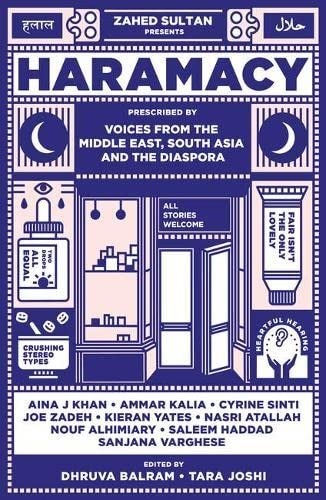
Haramacy (Unbound), edited by Zahed Sultan, Dhruva Balram and Tara Joshi
It’s my second day back in London after living away for more than seven years. I board the Overground train at Whitechapel to hear a stream of invective from the end of an otherwise silent carriage. A middle-aged man is levelling every known obscenity at the young man sitting opposite him. “Talk English!” he shouts. “Look at you – none of you talk English! What the hell are you doing in this country? Get the **** out of here.” No one intervenes.
It is into this Britain, with its perennial hues of nationalist racism, that Haramacy makes an intervention. Conceived in 2020 and authored during the pandemic, the book is an edited anthology of non-fiction writings by mostly Britain-based authors from the Middle East and South Asia and their diasporas. Its essays explore matters from music, love and sexuality to health, violence and capitalism, all interwoven with the overarching themes of ethnicity, heritage and home.
The title is a play on the Arabic word haram, meaning forbidden or indecent, and the English “pharmacy”. As such, it provides a tonic for the many assumptions, omissions and reductions that define contemporary discussions about race and society in the UK. As its editors Dhruva Balram and Tara Joshi observe of the dynamics of media and publishing, “we are largely asked to speak on our cultures and our ethnicity only when they are trending . . . We have often been frustrated in not being able to deliver the necessary stories we wanted to read about ourselves, our communities and our friends.”’
The disparate, multi-generational voices of Haramacy come as a riposte to the homogenising categories to which mainstream society has reduced diasporic identities. As Balram notes in an essay on his upbringing in Toronto, citing the Mauritian-Canadian writer Naben Ruthnum, “what people in the South Asian diaspora in the West share is that people looking at them assume that we all come from a similar place and past.”
Against these assumptions, the authors of Haramacy establish a dialogue amongst themselves as much as with the dominant culture – a discourse highlighting the many internal faultlines, conflicts and contradictions of identity and community. For example, Cyrine Sinti’s essay “The
Illegitimate Indian” is a sober account of her mixed gypsy heritage, and its role in shaping her often violent relations to British, European and Indian society. As she writes, “Midnight moon rituals, sex work and ethnic defiance to my left, white-supremacy, bare-knuckle fighting and fascist contempt to my right.”
While the voices in Haramacy deep-dive into questions of heritage, it is far from a work of mere introspection. Rather, its contents are deeply political and necessary meditations on currents of historical and structural racism as they shape all facets of individual lives. Notably, a number of essays decry how certain members of society have been viewed, not as people, but in terms of their productive capacities – as was made particularly stark during the pandemic. Among them, Sanjana Varghese writes in an essay on the lockdown in London, “I am tired of couching the value of people’s lives in productivity, like these people didn’t matter before they were disinfecting hospital surfaces or taking people’s garbage away.”
Similarly, Kieran Yates examines how the iniquitous dictates of labour in their most extreme form corrode the health of specific communities through sleep-deprivation, stress and exploitation. In this way, individual experiences of burn-out become deeply linked to struggles for equality. As she writes, “There is power in the politics of rest . . . in practical terms it fortifies us to be able to fight.”
Haramacy is as much a call for collective mobilisation as it is a vivid account of individual identities. Storytelling becomes yet another tool to counter the narratives of power. As Saleem Haddad explains, “The point was never to write to change the world. At best, once could write to open up the world somehow . . . To write through all the powerful narratives that strive to bury your voice.”
This piece is from the New Humanist winter 2022 edition. Subscribe here.

